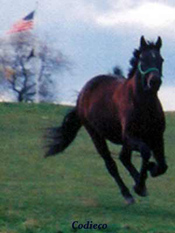
Join the EPN Announcement Only Mailing List
Shop for CD's at CDRush.com & the EPN Benefits!
Put "EPN" in the Coupon Code box when you place your order.
Now you can save money on your favorite music and help the horses at the same time!
EPN Merchandise
General
Press
Horse Slaughter
Horse Cruelty
Legislation
Stolen Horses
SiteMap
Horse Rescue
Rescue Stories
Turning Copper Into Gold
July 1996
Mare is Saved From Auction-Scored a Minus 1 On the Henneke Chart!

The Miracle Mile
July 1990
Pregnant Mare Foals Hours After Rescue From Slaughterhouse-
Foal is a Stakes Winner!

The Horse That The Killers Refused to Bid $5.00 On
July 1999
Emaciated and Sick Gelding Is Saved From Auction!
No charges ever filed...

Links
California Voters "Just Say Neigh" to Horse Slaughter!
HoofPAC
Shop online at IGive.com with over 600 great stores you know & love- including Back In the Saddle! Up to 26% of the purchase price is donated to the EPN!
Join today!The EPN gets $5 extra the first time you shop!
PayPal accepts credit cards! Please send your tax deductible donation to the:Equine Protection Network, Inc.,
P. O. Box 232, Friedensburg, PA, 17933.
Shop for CD's at CDRush.com & the EPN Benefits!
Put "EPN" in the Coupon Code box when you place your order.
Now you can save money on your favorite music and help the horses at the same time!
HoofPAC is the political action committee that has been formed to end the slaughter of America's horses. Cathleen Doyle, founder of HoofPAC, led the successful Save The Horses campaign in 1998 that made the slaughter of California's horses a felony.
Contact the EPN
Did You Know?
"There are not enough water buckets in the barn to catch all the water . We must turn off the faucet!"
Christine Berry, Equine Protection Network
Page last revised on:

Starting A Horse Rescue
An ounce of prevention is worth a pound of cure ...
Decide Your Focus
What type of horse welfare work do you want to participate in?
- Horse Welfare Advocacy
- Horse Cruelty Investigations
- Horse Sanctuary
- Horse Rescue and Rehabilitation
- Racehorse Retraining
Horse Welfare Advocacy
These organizations generally focus on horse welfare issues with limited hands on horse rescue. These organizations are often involved in advocacy, education and legislation on several horse welfare issues.
"It is important that we never lose sight that rescue without advocacy will not change people's thinking, set social policy, pass laws or abolish equine cruelty."
HoofPAC
Horse Cruelty Investigations
The EPN is interested in what happened to the person(s) responsible for putting the horse in a condition that violated the laws against cruelty to animals. Until we start holding owners accountable for their actions, nothing is going to change. Purchasing horses from neglectful or abusive owners removes the horse from that situation, but does nothing to hold the abuser accountable for their actions; instead the abuser is rewarded with money.
The organization's focus is on the enforcement of state(s) anti-cruelty laws. Organization has badged humane officers who investigate cases of horse cruelty involving neglect and abuse. This would vary as each state has different anti-cruelty laws. Organization may or may not have a facility to hold or house horses seized or surrendered in cruelty cases. Organization may or may not work in conjunction with horse rescue organizations to house horses.
If you are interested in this type of work, it is vital that you learn the Rules of Criminal Procedure & the Rules of Evidence which are often available online at your state's website. Courses in criminal procedure are available at many community colleges and universities, and are offered online Organizations working in this area of horse welfare must know how to investigate a horse cruelty case, what evidence to collect to prove the elements of the offense, how to hold and preserve the evidence for court, and how to testify in court.
Organizations must understand that owners of horses, even those who abuse and neglect horses, have rights under the United States Constitution, and if a law enforcement agency violates those rights, the entire case is put in jeopardy and there is the risk of civil rights lawsuits.
The goal of law enforcement is compliance with the law.
Horse Rescue and Rehabilitation
These organizations can be involved in several different aspects of horse welfare. Some organizations only accept donated horses. Other organizations purchase horses at auctions.
This type of organization needs a facility to house horses, including quarantine facilities. People with retraining skills may be necessary depending on the type of horses coming into the facility. Medical bills tend to be very high depending on the type of horses being rescued and from what situations.
Decisions on the types of horses to be acquired and by what means will need to be decided. Adoption policies, contracts, follow-ups on adopted horses are just a few of the decisions that will need to be made.
Horse Sanctuary
Horse Sanctuaries are organizations that generally do not adopt horses; instead the horses remain at the sanctuary until death. The horses can be either purchased by the organization or donated.
In the EPN's opinion horses should not be purchased by a sanctuary. There are hundreds of horses waiting for an opening at horse sanctuaries.
Ryerss Farm For Aged Equines is the oldest and largest non-profit organization of its kind in the United States and has a waiting list of over 200 horses. A $3500.00 donation is required before a horse can be accepted at Ryerss.
Horse sanctuaries can only provide homes for a finite number of horses. Because there are no adoptions, once a sanctuary is full, no new horses can be provided for until a current resident passes away.
Evidenced by the long waiting list at Ryerss, there is a need for well managed horse sanctuaries.
Policies in regards to the following must be determined:
- Age of horses accepted
- Medical conditions of horses accepted
- Donation upon acceptance
- Number of horses accepted
- Requirements for acceptance- vaccinations current, teeth floated, hooves trimmed, negative Coggins Test
Racehorse Retraining
There are organizations that specialize in the retraining and adoption or placement of retired Standardbred and Thoroughbred racehorses. Often the organizations work closely with the respective breed registries and related organizations including breeders, drivers, jockeys, owners and trainers.
By the sheer number of former racehorses that end up at auctions and then purchased by the "killer buyers" there is a need for this type of organization.
When considering this type of organization remember that many of these horses need layup time either in a stall or in a turnout situation. These horses also need retraining. An organization needs people skilled in training these horses, the facilities to retrain these horses, and people skilled in rehabilitation of racing injuries.
Racehorse retraining programs are doing wonderful work providing new careers for retired racehorses and in recent years several charities have been established to raise money for retired racehorses. This is a step in the right direction, but if we are to truly make a difference we must work to prevent the problem.
Horse rescues must not become the alternative trash can for Racing. The Racing industry must provide financial support for the horses that they have created, and often crippled and then discarded. It is not the American Public's responsibility to donate to horse welfare organizations to cover the cost of rescuing, rehabilitating, retraining, and retiring the Sport of King's trash. Racing must do all it can to prevent horses from being crippled, often before they have even reached maturity. Once a horse has become injured, the owners must take responsibility for the cost of the horse's care, not the American Public.
It is the EPN's position that when an organization focuses on one aspect of horse welfare there are less conflicts of interest, policy decisions are easier and there are fewer problems with public relations.
Organizing
After deciding your focus you will need to develop policies. The EPN recommends researching this issue by contacting several different horse welfare organizations and discussing their policies and the reasoning behind those decisions. The point of this is not to be in consensus, but to gather as much information as possible to assist your organization in making an informed policy decision.
A horse rescue organization's horse facility should be well run according to accepted horse industry management practices, anything less puts the horses in jeopardy of being neglected by the very people who are trying to rescue the horses.
The American Association of Equine Practitioners has published Care Guidelines for Equine Rescue & Retirement Facilities.
Filing for Non-Profit Status
The following is a very general overview of the process involved in becoming a 501c(3) non-profit organization. More information can be obtained from your respective state's Department of State and the Internal Revenue Service. There is also information available on the Internet. In PA the forms for filing to incorporate as a non-profit in PA are online. The IRS also has the forms and instructions for filing for non-profit status online.
The first step in becoming a 501c(3) non-profit is to become incorporated in your own state.
The following is some of what is required:
- Board of Directors. The IRS requires a minimum of 3 people.
- Develop a mission statement or purpose.
- Develop by-laws
- 2 year operating budget
- Statement of dissolution of funds if your organization dissolves
Commitment - Do You Know Where Your First Horse Is?Make the Commitment to Your Horse andSave America's Horses!
|
|||||||



